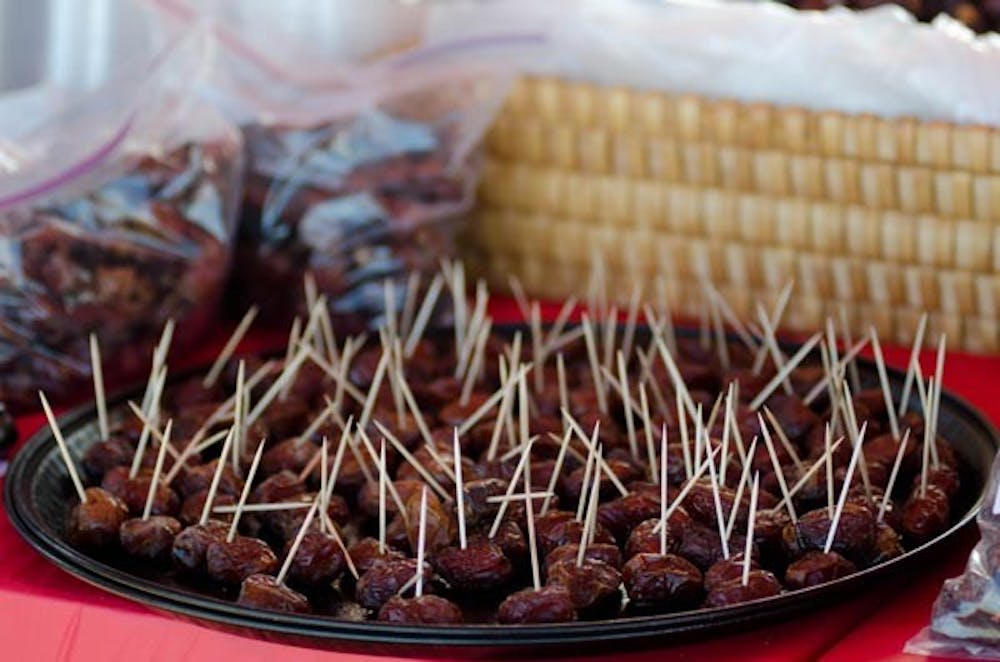It’s date season on the Polytechnic campus, but don’t expect to come home with a new beau.
October harvest is a time of celebration for students and volunteers at the Polytechnic campus date grove, and in an effort to share the culture of the date with the community, the ASU Arboretum hosted an inaugural festival Saturday, showcasing the special fruit in a whole new light.
More than 20 varieties of fresh dates awaited visitors to Saturday’s festival. Dates straight from the tree, as well as pre-packaged ASU dates were available to take home to remember the day.
The multitude of shapes, flavors and colors on display highlighted the hard work that has transpired over the past seven years in Mesa.
The date grove was established at the Polytechnic campus in 2003 east of Williams Street and Power Road. The 47-acre plot of land in Tempe that had served as a previous home for the grove was sold, said Deborah Thirkhill, program coordinator for ASU Arboretum.
“It is reported that the prophet Mohammed once told his companions that they should honor the date palm as one honors his aunt,” said Zaher Hajo, a volunteer at the date grove. “When asked why, he said that God created the date palm out of the leftover mud he used to create Adam.”
Hajo emigrated from Damascus, Syria, to the U.S. 26 years ago. He learned of the ASU date grove on the Internet as he was preparing to move to Arizona and became a volunteer shortly after arriving in April 2009.
“Dates were a part of our regular diet in Syria as any of the other common fruits are,” Hajo said. “Dates are very healthy and in fact several nutritional research studies have implied they be deemed a ‘super fruit.’”
The super fruit term refers to a fruit that combines nutrient richness, antioxidant quality and appealing taste.
As the most highly esteemed fruit in the Islamic culture, the fruit’s sweet tradition has continued at ASU, where a date palm grove acts as a reminder of Hajo’s faith.
The volunteers and date experts who had spent their time with the grove in Tempe since the 1990s followed the collection to the new location and have been working there ever since.
Volunteers from a wide range of backgrounds and countries have sought the grove out as a place of solitude. Many emigrants from Syria, Sudan, Africa and other parts of the Middle East, who grew up working in the date groves and farms, volunteer in the grove and are reminded of home, Thirkhill said.
“We have had a whole group of Iraqi refugees out here helping one day,” she said. “A lot of people from the mosque near ASU also come down to help.”
Locals who worked in the Tempe grove in the early 1930s and 1940s helped establish the large collection of dates seen now at ASU. More than 150 date palms of rare varieties, shapes, sizes and colors can be found at the grove, including the black abada, medjool, honey and thoory.
There are very few places in the U.S. where date palms grow, including California in the Mohave Desert, and here at home in the Sonoran Desert, Thirkhill said.
ASU is the only place in the country to host the Badrayah palm, a particularly rare date. The grove has shared offshoots of the palm with the USDA date palm grove in California for safekeeping to keep the rare date growing.
Pinak Nayak, a doctoral engineering student at ASU from Eastern India, has had a love for dates his whole life. He enrolled in the ASU Arboretum program in summer 2008 and soon after he began working in ASU’s date grove.
“I love trees and always try to contribute as much as I can to programs involving plantation and gardens,” Nayak said. “Over the years I have learned a lot about the date palms from the experts who also work there as volunteers.”
The ultimate reward of working at the date grove is getting a share of dates at the end of the year, he said. Many of the dates grown cannot be purchased at the store.
The grove plays a very important role in the conservation of rare date palms and is a wonderful source of date research and education for people who don’t know the culture, Nayak said.
Funding for the Arboretum and date grove comes from the sales of the packaged fruit, which Thirkhill brings to the ASU Bookstores and local farmers markets. The fruit was also sold exclusively at the Saturday festival.
The sales go toward the Arboretum and volunteer program, Thirkhill said.
Date palms have been the subject of many Arabic poems in the Arabic tradition, Hajo said.
“One of these verses says, ‘Be like the date palm: tall and majestic and above holding grudges,’” he said. “When it is struck by a stone, it throws back the sweetest of fruits.”
Reach the reporter at amoswalt@asu.edu





